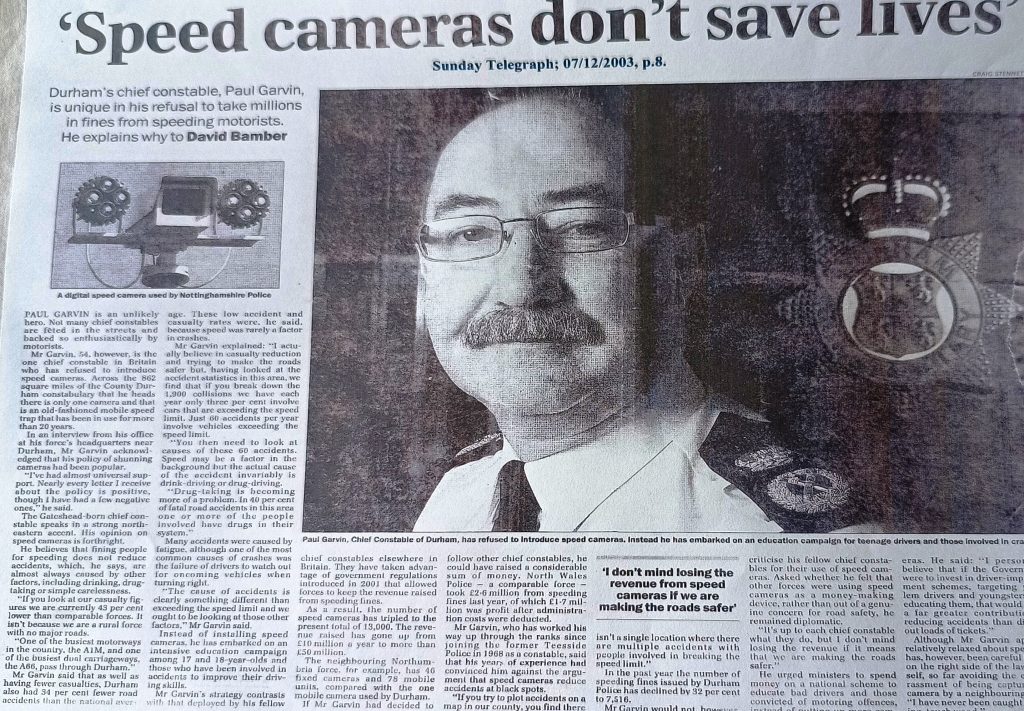
Paul Garvin is a former Chief Constable of Durham Constabulary to whom this Campaign pays enormous tribute for the courage and wisdom he displayed by taking a stand and refusing to allow speed cameras in his Force area.
Mr Garvin clearly understood the sentiments expressed in the 1947 Royal Commission Report on Road Safety which today’s Road Safety Industrial Complex has unfortunately moved so far away from.
As the Chief Constable of Durham Constabulary in the early part of this century when policing started to lose sight of what it was there for, and who it was there to serve, he was the only one of Britain’s 43 Chief Constables who refused to introduce speed cameras for reasons he explained in a Sunday Telegraph article (see below).
In refusing to introduce speed cameras Mr Garvin was operating in the best traditioons of the British Police Service which is POLICING BY CONSENT
Paul Garvin’s Approach To Making The Roads Safer
In an interview reported in the Sunday Telegraph in 2003 Mr Garvin expressed his firm belief in casualty reduction and trying to make the roads safer but having analysed the accident statistics in his Force area, for 1900 collisions each year he found that only 3% involved cars that were exceeding the speed limit – or just 60 accidents per year.
Looking into the causes of these 60 accidents, he concluded that speed may have been a factor in the background but the actual cause of the accident invariably was drink driving or drug driving.
In 40% of fatal road accidents in the Durham area one or more of the people involved had drugs in their system.
Mr Garvin believed that fining people for speeding does not reduce accidents which he said were almost always caused by other factors including drinking, drug taking or simple carelessness. Speed he said was rarely a factor in crashes.
Many accidents were caused by fatigue although one of the most common causes was the failure of drivers to watch out for oncoming vehicles when turning right.
Paul Garvin noted that his policy of shunning speed cameras had been popular.
“I’ve had almost universal support”. He said. “Nearly every letter I receive about the policy is positive”.
Instead of installing speed cameras he embarked on an intensive education campaign among 17 and 18 year olds and drivers who were involved in accidents to improve their driving skills.
Mr Garvin said his years of experience had convinced him against the argument that speed cameras reduce accidents at black spots.
“If you plot accidents on a map in our county you find there isn’t a single location where there are multiple accidents with people involved in breaking the speed limit
He urged Ministers to spend money on a national scheme to educate bad drivers and those convicted of motoring offences instead of putting up more cameras saying:
“I personally believe that if the government were to
invest in driver improvement schemes,
targeting problem drivers and youngsters and educating them ,
that would make a far greater contribution to reducing accidents
than dishing out loads of tickets.”
Unfortunately his plea to Ministers fell on deaf ears then.
IT NOW FALLS TO THIS CAMPAIGN TO HAVE ANOTHER GO
WE NEED NOW TO PUSH TO INSTITUTIONALISE THE PAUL GARVIN APPROACH TO SAVING LIVES AND RETURN TO THE ACCEPTABLE FACE OF POLICING, / POLICING BY CONSENT